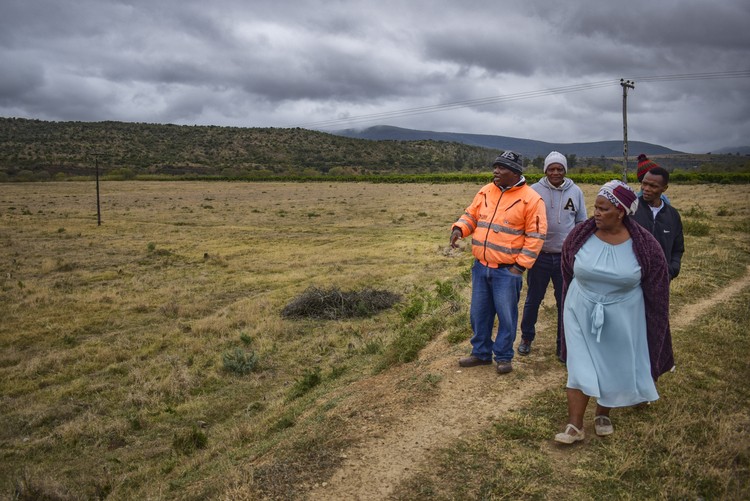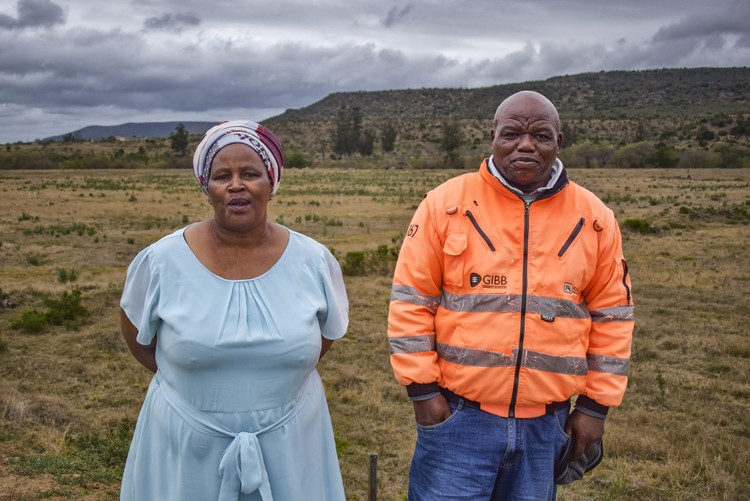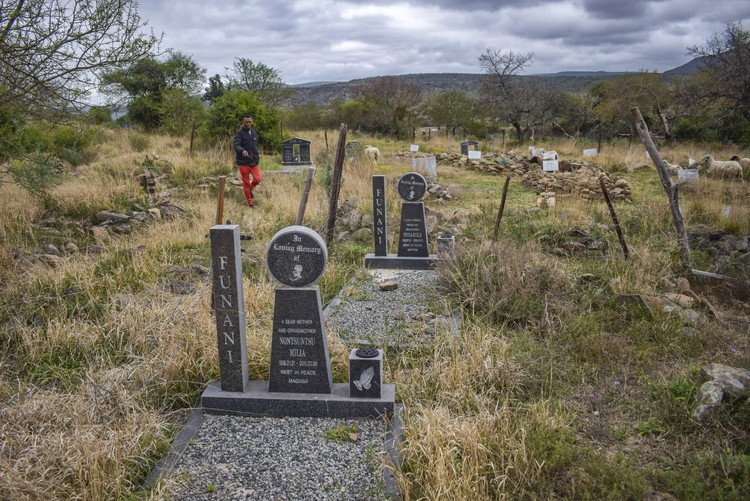Eastern Cape family waits for promised right to farm land where their ancestors worked
Department of Rural Development and Land Reform silent on why it’s taken years to issue a lease promised in 2019
The Matya family has been waiting since 2019 for the national Department of Rural Development and Land Reform to give them the rights to farm citrus on this land in the Eastern Cape. Photos: Lucas Nowicki
- The Matya family has been waiting for years for the national Department of Agriculture, Rural Development and Land Reform to keep its promise to lease them the land near where their ancestors used to live.
- The department sent them a letter in 2019, in which it “confirms its intention to enter a 30-year lease” agreement on the land, which now belongs to the state.
- But the Matyas are still waiting for the lease. In the meantime, they have to rely on a pensioner’s grant and money they make from selling firewood and aloe.
- The department told GroundUp that it is working on getting the agreement to the family but did not say when or why it has taken so long.
A family living on a plot of land between Fort Beaufort and Seymour in the Eastern Cape is still waiting for a 30-year lease on state land for citrus farming promised in 2019.
Without the lease, the Matya family of six, have no consistent income. They rely on the old age grant of the elderly uncle who lives with them as well as occasionally harvesting and selling aloe and firewood.
“We don’t know what to do now. We have done everything we can,” says Thembisa Matya, overlooking the nearly 390-hectares of state land they were promised under the State Land Lease and Disposal Policy. His ancestors used to work and live on the land which is right next to the government-owned property they wish to farm on.
Lulamile Matya says his great-great-grandfather was born on the white-owned citrus farm in 1916, where he lived, worked and died. Some of Lulamile’s relatives’ graves are still on the farm. Lulamile was born in 1965 and worked on the citrus farm like his father and grandfather before him.
In 1982, the land was absorbed as part of the Ciskei under the homelands classification during apartheid. The land was used by the Ciskei government for an agricultural school called Fort Cox, where students would manage pieces of land.
Lulamile and his family are part of a small community of about 10 families called ‘Paradise farm’.
Thembisa and Lulamile Matya stand on the vacant land which government, in 2019, promised to lease to them for 30 years for farming. They are still waiting.
In 2001, Lulamile and Thembisa Matya, who have four children, applied to farm the land where his family used to live, through the Department of Land Affairs. In response, the department stated it was “currently investigating the status and appropriate way forward with regards to the Alice/Kat citrus farms” and added that “this matter will be addressed shortly”.
The Matyas did not hear back from the government until 15 years later, when the Department of Agriculture, Rural Development and Land Reform sent them a one-year caretakership lease for a section of the land. The family then set up the Joe Modise Agricultural Co-operative Limited, and created a committee to meet the requirements of the state’s application process.
Then, in 2017, near the end of term for the lease, the family received another letter from the department, this time offering them a 30-year lease under the States Land Lease and Disposal Policy of 2013.
Two years later, on 14 August 2019, the family received another letter “confirming lawful occupation and utilisation of state farms”.
The letter read: “This further confirms that it is the intention of the department to enter into a long term thirty (30) year lease agreement with the Joe Modise Agricultural Co-operative Limited represented by Lulamile Kindwell Solwandle [Matya] Once all lease processes have been followed and approval by the relevant committee obtained.”
“We were so excited. We even rented a chainsaw and started clearing the land in anticipation of receiving the lease. It was very expensive,” says Thembisa.
More than four years later, the family is still waiting for their 30-year lease agreement.
“They [the department] don’t come here. We have to rent a car to travel to their offices in East London, and they don’t write things down, they just make verbal promises,” says Thembisa.
Some of the Matya family’s graves on a section of the land.
Lulamile says he has spent thousands of rands on transport to East London to get answers about their lease. There are very few work opportunities in Paradise Farm and surrounding areas, according to Thembisa.
Lulamile has not had any work since 1997. He occasionally sells firewood on the side of the road for some income.
The main source of income for residents of Paradise Farm is social grants and harvesting of aloe, says Thembisa, who harvests aloe with some members of her family. A buyer travels from Fort Beaufort and purchases it for R80 per 5-litre container. The aloe is then distributed in cities across the Eastern Cape, says Thembisa.
The Matyas say that once they get the lease for citrus farming and livestock, the whole community of Paradise Farm will benefit. “There is no work here. It would be such a big opportunity for our community to farm,” says Thembisa.
In response to questions about the Matya’s lease, Reggie Ngcobo, spokesperson for the national Department of Rural Development and Land Reform told GroundUp that the officials will “endeavour to expedite conducting and concluding of the land rights enquiry to allocate the farm to the occupiers of a 30 year lease agreement.”
He did not provide any explanation for why the family has had to wait so long or what difficulties the department had in the leasing process, but did state that the department has to conduct a “land right enquiry before they allocate” the lease.
Support independent journalism
Donate using Payfast

Don't miss out on the latest news
We respect your privacy, and promise we won't spam you.
Letters
Dear Editor
As an Australian who visited your beautiful country in February 2024, I was heartbroken and appalled to read about the plight of this poor family. It beggars belief that so many Black Africans have to fight for so long to provide their families with a decent income in order to survive, and yet still nothing is forthcoming, especially when there is absolute proof of their family connection.
I can only pray that the powers that be will come to their aid immediately by granting this promised 30-year lease to these poor folk, who’ve already spent so much in order to develop the land of their ancestors.
Have a heart and do the right thing.
© 2023 GroundUp. This article is licensed under a Creative Commons Attribution-NoDerivatives 4.0 International License.
You may republish this article, so long as you credit the authors and GroundUp, and do not change the text. Please include a link back to the original article.
We put an invisible pixel in the article so that we can count traffic to republishers. All analytics tools are solely on our servers. We do not give our logs to any third party. Logs are deleted after two weeks. We do not use any IP address identifying information except to count regional traffic. We are solely interested in counting hits, not tracking users. If you republish, please do not delete the invisible pixel.



